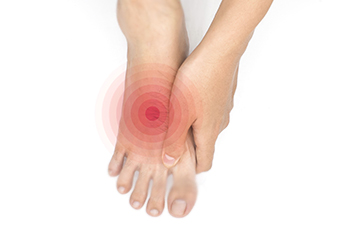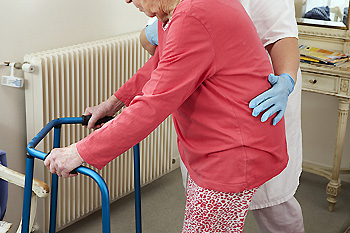Connect With Us
Blog
Items filtered by date: June 2023
Diabetes and Podiatry

Diabetes can affect the feet, and complications may ensue. Practicing a daily diabetic foot care routine is crucial in protecting the feet from this serious disease, and there are simple methods that can accomplish this. These can include washing and drying the feet daily, followed by inspecting the soles. Many people use a mirror to do this, or possibly have a family member or caregiver help them, if available. The skin can be kept smooth by using a good moisturizer, and it is important to refrain from applying it between the toes. It may be helpful to wear socks that have extra cushioning and do not have elastic tops. These types of socks are designed for diabetic patients and are also made from materials that can absorb moisture. Nerve damage, or neuropathy can often accompany diabetes, which is the inability to feel existing cuts or scrapes that are on the bottom of the feet. It is advised against walking barefoot at any time, which may help to protect the feet from incurring wounds. If you have diabetes, it is strongly suggested that you are under the care of a podiatrist who can help to manage this condition.
Diabetic foot care is important in preventing foot ailments such as ulcers. If you are suffering from diabetes or have any other concerns about your feet, contact Michael Tomey, DPM from Cary Foot & Ankle Specialists. Our doctor can provide the care you need to keep you pain-free and on your feet.
Diabetic Foot Care
Diabetes affects millions of people every year. The condition can damage blood vessels in many parts of the body, especially the feet. Because of this, taking care of your feet is essential if you have diabetes, and having a podiatrist help monitor your foot health is highly recommended.
The Importance of Caring for Your Feet
- Routinely inspect your feet for bruises or sores.
- Wear socks that fit your feet comfortably.
- Wear comfortable shoes that provide adequate support.
Patients with diabetes should have their doctor monitor their blood levels, as blood sugar levels play such a huge role in diabetic care. Monitoring these levels on a regular basis is highly advised.
It is always best to inform your healthcare professional of any concerns you may have regarding your feet, especially for diabetic patients. Early treatment and routine foot examinations are keys to maintaining proper health, especially because severe complications can arise if proper treatment is not applied.
If you have any questions please feel free to contact our office located in Cary, NC . We offer the newest diagnostic and treatment technologies for all your foot and ankle needs.
Causes of a Broken Foot

A broken foot is painful. It generally happens suddenly from falling and is considered a common type of injury. Bruising, severe pain, and swelling often accompany a broken foot, and the range of motion can be limited. Walking is difficult, if not impossible, and prompt medical attention is typically sought for relief. Dropping a heavy object on the foot is also a common cause of a broken foot, and the severity of the break may depend on the angle the object was dropped from. People who frequently participate in sporting activities may endure a broken foot, and soccer players may be prone to incurring this type of fracture from kicking the ball. A diagnosis consisting of having an X-ray taken can be performed, followed by beginning the correct treatment. Most people who have broken footwear have a cast or protective boot until it has healed, which can take several weeks. If you have broken your foot, it is suggested that you speak with a podiatrist who can correctly diagnose and treat this condition.
A broken foot requires immediate medical attention and treatment. If you need your feet checked, contact Michael Tomey, DPM from Cary Foot & Ankle Specialists. Our doctor can provide the care you need to keep you pain-free and on your feet.
Broken Foot Causes, Symptoms, and Treatment
A broken foot is caused by one of the bones in the foot typically breaking when bended, crushed, or stretched beyond its natural capabilities. Usually the location of the fracture indicates how the break occurred, whether it was through an object, fall, or any other type of injury.
Common Symptoms of Broken Feet:
- Bruising
- Pain
- Redness
- Swelling
- Blue in color
- Numbness
- Cold
- Misshapen
- Cuts
- Deformities
Those that suspect they have a broken foot shoot seek urgent medical attention where a medical professional could diagnose the severity.
Treatment for broken bones varies depending on the cause, severity and location. Some will require the use of splints, casts or crutches while others could even involve surgery to repair the broken bones. Personal care includes the use of ice and keeping the foot stabilized and elevated.
If you have any questions please feel free to contact our office located in Cary, NC . We offer the newest diagnostic and treatment technologies for all your foot and ankle needs.
Heel Pain Can Be Treated!
Reasons for a Tight Achilles Tendon

If you are an active person who frequently uses your legs, your Achilles tendon may feel tight. Wearing shoes with elevated heels, where the heel is higher than the ball of the foot, can shorten the muscles in the back of the leg. This feeling can be replicated by pointing your toes down. While active, this happens naturally, but when it is from shoes, it is an artificial shortening position that can cause tightness. Toe springs in shoes elevate the toes, hold them there without natural engagement, and shorten the muscles from the top of the foot. When the muscle running along the outside of the shinbone is tight, the surrounding muscles tighten up and the Achilles tendon is less likely to stretch and contract fully. Walking barefoot can restore foot function, allow toes to spread out, and build stronger feet, but this has its disadvantages as well. Wearing minimalist or barefoot shoes are alternative options that can be considered. An effective way to prevent the sensation of tightness in the Achilles tendon area is to stretch the legs and feet each day. Rolling a massage ball from the top to the bottom just outside the shin bone is a myofascial release that can relieve tightness. Deep squatting, with or without a wall as support, can also help. If you have a tight Achilles tendon that persists, it is suggested that you visit a podiatrist who can help you with additional treatment options.
Achilles tendon injuries need immediate attention to avoid future complications. If you have any concerns, contact Michael Tomey, DPM of Cary Foot & Ankle Specialists. Our doctor can provide the care you need to keep you pain-free and on your feet.
What Is the Achilles Tendon?
The Achilles tendon is a tendon that connects the lower leg muscles and calf to the heel of the foot. It is the strongest tendon in the human body and is essential for making movement possible. Because this tendon is such an integral part of the body, any injuries to it can create immense difficulties and should immediately be presented to a doctor.
What Are the Symptoms of an Achilles Tendon Injury?
There are various types of injuries that can affect the Achilles tendon. The two most common injuries are Achilles tendinitis and ruptures of the tendon.
Achilles Tendinitis Symptoms
- Inflammation
- Dull to severe pain
- Increased blood flow to the tendon
- Thickening of the tendon
Rupture Symptoms
- Extreme pain and swelling in the foot
- Total immobility
Treatment and Prevention
Achilles tendon injuries are diagnosed by a thorough physical evaluation, which can include an MRI. Treatment involves rest, physical therapy, and in some cases, surgery. However, various preventative measures can be taken to avoid these injuries, such as:
- Thorough stretching of the tendon before and after exercise
- Strengthening exercises like calf raises, squats, leg curls, leg extensions, leg raises, lunges, and leg presses
If you have any questions please feel free to contact our office located in Cary, NC . We offer the newest diagnostic tools and technology to treat your foot and ankle needs.
Preventing Falls by the Pool for Seniors

Senior citizens are particularly vulnerable to fractured feet and other foot conditions that can result from suffering a fall. Therefore, a senior may consider taking certain steps to minimize the likelihood of enduring a fall. One place where a senior may be at an increased risk of tripping is by the poolside. To decrease the risk of suffering a fall by the pool, a senior could ensure that pool equipment is kept organized and tidy. Additionally, it may be helpful to install a slip-resistant deck or handrails to increase stability in the feet when walking. To prevent falls by the pool, a person may also try increasing strength and mobility in their feet. If you are a senior or are caring for one, it is suggested that you schedule an appointment with a podiatrist today for more information.
Preventing falls among the elderly is very important. If you are older and have fallen or fear that you are prone to falling, consult with Michael Tomey, DPM from Cary Foot & Ankle Specialists. Our doctor will assess your condition and provide you with quality advice and care.
Every 11 seconds, an elderly American is being treated in an emergency room for a fall related injury. Falls are the leading cause of head and hip injuries for those 65 and older. Due to decreases in strength, balance, senses, and lack of awareness, elderly persons are very susceptible to falling. Thankfully, there are a number of things older persons can do to prevent falls.
How to Prevent Falls
Some effective methods that older persons can do to prevent falls include:
- Enrolling in strength and balance exercise program to increase balance and strength
- Periodically having your sight and hearing checked
- Discuss any medications you have with a doctor to see if it increases the risk of falling
- Clearing the house of falling hazards and installing devices like grab bars and railings
- Utilizing a walker or cane
- Wearing shoes that provide good support and cushioning
- Talking to family members about falling and increasing awareness
Falling can be a traumatic and embarrassing experience for elderly persons; this can make them less willing to leave the house, and less willing to talk to someone about their fears of falling. Doing such things, however, will increase the likelihood of tripping or losing one’s balance. Knowing the causes of falling and how to prevent them is the best way to mitigate the risk of serious injury.
If you have any questions, please feel free to contact our office located in Cary, NC . We offer the newest diagnostic and treatment technologies for all your foot care needs.

